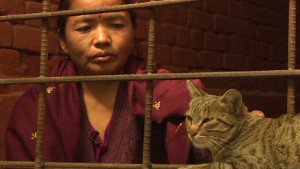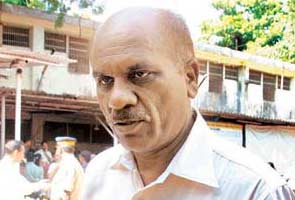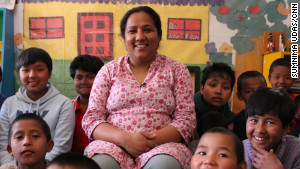Kathmandu, Nepal (CNN) -- Pushpa Basnet doesn't need
an alarm clock. Every morning, the sounds of 40 children wake her up in
the two-story home she shares with them.
As she helps the children
dress for school, Basnet might appear to be a housemother of sorts. But
the real story is more complicated.
All of these children once lived in Nepal's prisons. This 28-year-old woman has saved every one of them from a life behind bars.
Nepal is one of the
poorest countries in the world -- according to UNICEF, 55% of the
population lives below the international poverty line -- so it lacks the
social safety net that exists in most Western nations. Space is
extremely limited in the few children's homes affiliated with the
government.
So when no local guardian
is available, an arrested parent often must choose between bringing
their children to jail with them or letting them live on the streets.
Nepal's Department of Prison Management estimates 80 children live in
the nation's prisons.
"It's not fair for
(these) children to live in the prison because they haven't done
anything wrong," said Basnet, who started a nongovernmental organization
to help. "My mission is to make sure no child grows up behind prison
walls."
Basnet is one of several
in Nepal who have started groups to get children out of prison. Since
2005, she has assisted more than 100 children of incarcerated parents.
She runs a day care program for children under 6 and a residential home
where mostly older children receive education, food, medical care and a
chance to live a more normal life.
Since 2005, Pushpa Basnet has assisted more than 100 children of incarcerated parents.
"I had a very fortunate life, with a good education," Basnet said. "I should give it to somebody else."
Basnet was just 21 when
she discovered her calling, she said. While her family ran a successful
business, she was studying social work in college. As part of her
studies, she visited a women's prison and was appalled by the dire
conditions. She also was shocked to discover children living behind
bars.
One baby girl grabbed Basnet's shawl and gave her a big smile.
"I felt she was calling
me," Basnet said. "I went back home and told my parents about it. They
told me it was a normal thing and that in a couple of days I'd forget
it. But I couldn't forget."
Basnet decided to start a
day care to get incarcerated children out from behind the prison walls.
While her parents were against the idea at first -- she had no job or
way to sustain it financially -- eventually they helped support her. But
prison officials, government workers and even some of the imprisoned
mothers she approached doubted that someone her age could handle such a
project.
"When I started, nobody believed in me," Basnet said. "People thought I was crazy. They laughed at me."
But Basnet was
undaunted. She got friends to donate money, and she rented a building in
Kathmandu to house her new organization, the
Early Childhood Development Center.
She furnished it largely by convincing her parents that they needed a
new refrigerator or kitchen table; when her parents' replacement would
arrive, she'd whisk the old one to her center.
 Saved from a life behind bars
Saved from a life behind bars
Just two months after
she first visited the prison, Basnet began to care for five children.
She picked them up at the prison every weekday morning, brought them to
her center and then returned them in the afternoon. Basnet's program was
the first of its kind in Kathmandu; when she started, some of the
children in her care had never been outside a prison.
Two years later, Basnet
established the Butterfly Home, a children's home where she herself has
lived for the past five years. While she now has a few staff members who
help her, Basnet is still very hands on.
"We do cooking, washing,
shopping," she said. "It's amazing, I never get tired. (The children)
give me the energy. ... The smiles of my children keep me motivated."
Coordinating all of this
is no easy task. But at the Butterfly Home, the older kids help care
for the younger ones and everyone pitches in with household chores. The
atmosphere feels like an extremely large family, a feeling that's
fostered by Basnet, who smothers the children with love. The children
reciprocate by calling her "Mamu," which means "Mommy."
"I don't ever get a day
off, but if I [didn't] have the children around me, it would be hard,"
she said. "When I'm with them, I'm happy."
All the children are at
the Butterfly Home with the consent of the imprisoned parent. When
Basnet hears about an imprisoned child, she'll visit the prison -- even
in remote areas of the country -- and tell the parent what she can
provide. If the parent agrees, Basnet brings the child back.
She is still eager,
however, for the children to maintain relationships with their parents.
During school holidays, she sends the younger children to the prisons to
visit, and she brings them food, clothing and fresh water during their
stay. Ultimately, Basnet wants the families to reunite outside prison,
and 60 of her children have been able to do just that.
My life would have been dark without (Pushpa). I would've probably always had a sad life.
Laxmi, 14 years old
Parents like Kum Maya
Tamang are grateful for Basnet's efforts. Tamang has spent the last
seven years in a women's prison in Kathmandu. When she was convicted on
drug charges, she had no other options for child care, so she brought
her two daughters to jail with her. When she heard about Basnet's
program, she decided to let them go live with her.
"If Pushpa wasn't
around, (they) could have never gotten an education ... (they) would
have probably had to live on the streets," she said. "I feel she treats
(them) the way I would."
Tamang's oldest daughter, Laxmi, said she can't imagine life without Basnet.
"My life would have been
dark without her," said Laxmi, 14. "I would've probably always had a
sad life. But now I won't, because of Pushpa."
In 2009, Basnet started a
program to teach the parents how to make handicrafts, which she sells
to raise money for the children's care. Both mothers and fathers
participate. It not only gives them skills that might help them support
themselves when they're released, but it also helps them feel connected
to their children.
"Often, they think that
they're useless because they're in prison," Basnet said. "I want to make
them feel that they are contributing back to us."
Making ends meet is
always a struggle, though. The children help by making greeting cards
that Basnet sells as part of her handicraft business. In the past, she
has sold her own jewelry and possessions to keep the center going.
Her biggest concern is
trying to find ways to do more to give the children a better future. She
recently set up a bank account to save for their higher educations, and
one day she hopes to buy or build a house so they'll always have a
place to call home. Their happiness is always foremost in her thoughts.
"This is what I want to
do with my life," she said. "It makes me feel (good) when I see that
they are happy, but it makes me want to work harder. ... I want to
fulfill all their dreams."
By Kathleen Toner, CNN





 Saved from a life behind bars
Saved from a life behind bars